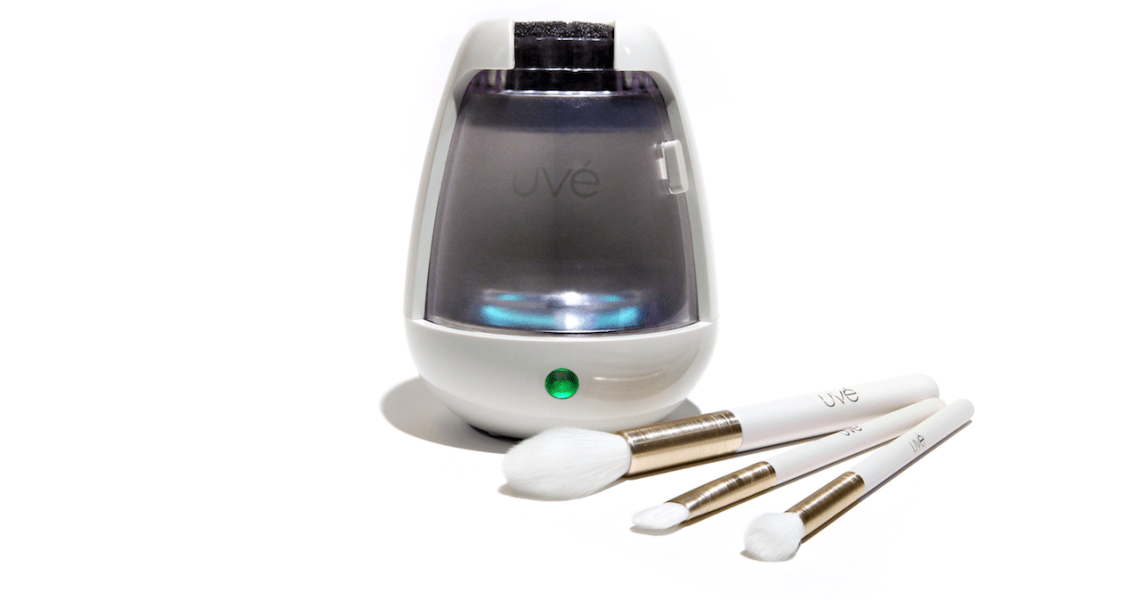With the Covid-19 pandemic causing consumers to think about all things hygiene, beauty brands and retailers are getting on board with an antimicrobial obsession.
UVé Beauty launched on November 19 with a collection of antimicrobial makeup sponges and brushes, and UV sanitization devices for them. Sold exclusively through its DTC website, the brand has already sold out of both of the sterilization devices. The launch comes at a time when the pandemic has brought hygiene concerns to the forefront of consumers’ minds in beauty. According to SimilarWeb, the search term “antimicrobial” surged by 255% in March and April after the pandemic hit the U.S.

“Companies and creators became wise” to interest in antimicrobial products, said Alisha Kapur, a beauty and personal care industry consultant at SimilarWeb. She noted that “demand remained strong from May to October. And we’re now seeing the advent of many different types of antimicrobial products, including and especially antimicrobial face masks and pillow cases.”
Makeup brush contamination is “actually a big, well-known issue,” said John Nguyen, co-founder and COO of UVé. “If you ask any dermatologist or esthetician, they’re going to tell you straight up, that it’s dangerous — but you just don’t hear a lot about it. People are starting to be a little bit more aware of the hygiene side because of Covid.”
The term “antimicrobial” is increasingly being used in conjunction with makeup brushes and sponges to address consumers’ fears about germs. Retailers including Macy’s and Kohl’s stock antimicrobial brushes by brands including Spa Sciences and Michael Todd. UVé Beauty is in talks to launch at a major chain by the end of the first quarter of 2021. UV sanitizer devices have been popping up at retailers — they’re not only for makeup brushes, but also for small electronics and toothbrushes.
Plans to create UVé Beauty began four and a half years ago, based mainly on consumers’ growing concerns around cleanliness. These were intensified as influencers’ videos in which they cut up their old beauty blenders flooded beauty YouTube, prompting discussions about the best ways to clean them. BeautyBlender has addressed the issue by selling a $16 bar soap to clean the products. The price of UVé’s sponge is on par with that of the $20 BeautyBlender, but slightly less expensive at $14.99.
Ad position: web_incontent_pos1
In October 2019, a scientific study on makeup blenders and other cosmetic products found that 79-90% of products contained bacteria, including Staphylococcus. The most common pre-Covid concern about dirty brushes and blenders was acne, but they have been known to cause much worse — in 2015, a woman reportedly became paralyzed due to a MRSA infection from a makeup brush. Concerns about testers in beauty retailers also existed before the pandemic, while product sampling is now being completely revamped.
According to Nguyen, the process of developing antimicrobial products for beauty involved visiting medical conferences to learn about sterilization devices and surfaces being used in hospitals, and then applying the technology to sponges and makeup brushes. The UV sterilizers use UV-C light, which early research suggests is capable of killing the Covid-19 virus.
In addition to consumers, UVé Beauty is also working with makeup artists. Nguyen said that UVé’s products have been used for shoots in Harper’s Bazaar, Glamour and Maxim, as well as on the set of TV shows, including one on Bravo. (He did not disclose the names of the shows.)
“As a whole, the entire planet is more clean-conscious now,” said Nguyen. “That will eventually trickle on down to makeup brushes. You don’t want to scare people, but you want people to be aware.”




